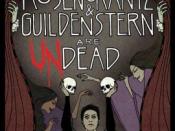William Shakespeare and Tom Stoppard, through their plays, "Hamlet" and "Rosencrantz and Guildenstern are Dead", respectively, reveal attributes of the cultural context and social values that their respective era's were signatory to.
Unlike his first and second soliloquies, Hamlet's third soliloquy seems to be ruled by reason and not frantic emotion. In his speech, Hamlet poses the validity and worthiness of life, asking himself," To be or not to be", that is to live or not to live, which incites an internal philosophical debate on the advantages and disadvantages of existence. He debates, quote, "whether 'tis nobler in the mind to suffer" or to, "take arms against a sea of troubles" Is it any more admirable, Hamlet asks, to endure life, or more specifically, evil, passively, or does true nobility entail actively seeking the ultimate private revenge by ending a life. This strikes a chord with a fundamental human concern during the Elizabethan era; is suicide justifiable? In Hamlets words, it is seemed suicide as a desirable alternative to life in a painful world, yet, nowhere does Hamlet in the speech refer to his individual circumstance.
He speaks explicitly of, quote, "us all''. This quote undeniably reveals that Shakespeare was concerned with allowing spectators to themselves question their individual moral stance on the issue of suicide, and that he too, is questioning the morality of the situation. Morality plays, during the 16th Century, had developed into becoming an illustrious form of entertainment of England, as it had alluded to moral and religious themes which often arose from context.
Shakespeare suggests that he is well aware that suicide is condemned by the church as a mortal sin, when Hamlet states that his reason opposing suicide is, quote, "the law's delay". Hamlet feels that the alternative of suicide is closed to...


